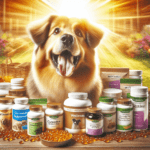
Maintaining the health and vitality of your furry friend is crucial, and canine wellness supplements offer a fantastic way to support a healthy skin and coat for dogs. These supplements are packed with essential nutrients like omega-3 fatty acids, glucosamine, probiotics, and multivitamins, all designed to ensure your dog’s overall well-being. By incorporating these into your pet’s diet, you can help support a normal inflammatory response, promote joint health, and maintain a glossy, healthy coat. It’s always best to talk to your vet before introducing any new health regimen, but you’re likely to find that these supplements bring noticeable improvements in your dog’s skin health and coat shine, making your loyal companion even happier and healthier. Have you ever wondered if there’s more you could do to ensure your furry friend has vibrant health and a shiny coat? Your dog’s skin and coat are not only significant indicators of their overall well-being but also essential barriers that protect them from environmental hazards. With the right care, including the use of canine wellness supplements, you can help maintain your dog’s skin and coat health more effectively. In this article, we’ll dive deep into how these supplements can benefit your dog and what you need to know to make an informed choice.

Understanding Canine Wellness Supplements
Canine wellness supplements are specially formulated products designed to support various aspects of your dog’s health. These supplements can offer numerous benefits, including improved skin and coat condition, enhanced joint health, and stronger immunity. Typically, these products contain a mix of essential nutrients, vitamins, minerals, and other beneficial ingredients that work synergistically to promote overall health.
Why Supplements?
Supplements can help address specific deficiencies that dog food alone might not cover. Even the best diet might lack certain nutrients essential for optimal skin and coat health. Additionally, supplements can provide targeted support for conditions like dry skin, excessive shedding, or other dermatological issues.
Essential Nutrients for Healthy Skin and Coat
For your dog to have a healthy coat and skin, they need a balanced diet rich in certain nutrients. Here’s a breakdown of key nutrients vital for this purpose:
Omega-3 and Omega-6 Fatty Acids
Omega-3 and Omega-6 fatty acids are essential for maintaining healthy skin and a glossy coat. They help reduce inflammation and can alleviate symptoms of skin conditions such as eczema and psoriasis.
- Sources: Fish oil, flaxseed oil, and specific fish-based dog foods.
- Benefits: Supports skin hydration, reduces inflammation, improves coat shine.
Vitamins A, E, and B-complex
These vitamins are crucial for skin repair, protection against free radicals, and overall cellular health.
- Vitamin A: Enhances skin cell turnover and repairs damaged tissues.
- Vitamin E: Acts as an antioxidant to protect skin cells.
- B-complex vitamins: Crucial for overall skin health and vitality.
Zinc and Biotin
These minerals and vitamins play significant roles in maintaining healthy skin and fur.
- Zinc: Promotes skin healing and reduces inflammation.
- Biotin: Supports hair growth and overall skin health.
Protein
High-quality proteins are vital for skin and coat health. Proteins ensure the body can build and repair skin cells and hair follicles.
- Sources: Meat, eggs, and specific protein-based supplements.
Popular Canine Wellness Supplements
Various supplements are well-regarded for their ability to promote healthy skin and coat in dogs. Here are some popular options:
- Fish Oil Supplements: Rich in Omega-3 fatty acids.
- Multivitamins: Provide comprehensive health support, including for the skin and coat.
- Biotin Supplements: Specifically formulated to enhance fur and skin.
- Probiotics: Improve gut health, which indirectly benefits skin by enhancing nutrient absorption.
- Glucosamine and Chondroitin: Often used for joint health but also support overall well-being, indirectly benefiting the skin.
How to Choose the Right Supplement
When selecting a supplement for your dog, several factors need consideration to ensure you make the best choice for their specific needs.
Quality Ingredients
Always opt for products that boast high-quality, natural ingredients. Supplements recognized by credible organizations like the National Animal Supplement Council (NASC) ensure you’re getting a product that meets certain standards.
Specific Health Needs
Identify your dog’s specific issues and select a product tailored to address those concerns. For example, if your dog experiences dry skin, a fish oil supplement rich in omega fatty acids might be ideal.
Consult Your Veterinarian
Before introducing any new supplement into your dog’s regimen, it’s crucial to talk to your vet. They can provide personalized recommendations based on your dog’s health history and current condition.

Dosage and Administration
Determining the right dosage is essential for the supplement’s effectiveness. Overdosing can lead to adverse effects, while underdosing might not provide the desired benefits.
General Guidelines
- Follow the Label Instructions: Manufacturers typically provide usage instructions tailored to the product’s formulation.
- Weight-Based Dosing: Many supplements recommend dosages based on your dog’s weight.
- Frequency: Administer supplements as directed—some might be daily, while others might be weekly.
Forms of Supplements
Supplements come in various forms such as chewables, powders, and liquids. Choose the form your dog is most comfortable with to ensure they take it consistently.
Benefits of Canine Wellness Supplements
Improving your dog’s skin and coat health through supplements can lead to a number of benefits that contribute to their overall health and happiness.
Improved Appearance
A dog with a healthy coat is a sight to behold. Their fur will be shinier and softer, and their skin free from irritation and dryness.
Enhanced Well-Being
Healthier skin leads to a reduction in itching and discomfort, making your dog happier and more energetic.
Strong Immunity
A good diet supplemented with essential nutrients strengthens the immune system, making your dog better equipped to fend off infections and illnesses.

Natural Dog Remedies for Skin and Coat Health
Aside from supplements, natural remedies can also support your dog’s skin and coat health. These can be used alone or in conjunction with supplements for maximum benefit.
Coconut Oil
Coconut oil is highly beneficial for moisturizing your dog’s skin and can also help with wound healing.
- Application: Apply directly to the skin or mix a small amount into their food.
Aloe Vera
Aloe Vera has soothing properties that can help alleviate itching and irritation.
- Application: Look for pet-specific Aloe Vera products and follow the usage instructions.
Apple Cider Vinegar
Apple cider vinegar has antibacterial and antifungal properties that can benefit the skin.
- Application: Dilute with water and spray lightly onto the coat, avoiding the face.
How to Tell If Your Dog Needs Supplements
Not all dogs will require supplements, but some signs can indicate a need for extra nutritional support.
Common Symptoms to Watch For
- Dry, Flaky Skin: Indicates a possible deficiency in essential fatty acids.
- Excessive Shedding: Could signal inadequate nutrition affecting the coat.
- Dull Coat: May suggest a lack of certain vitamins or minerals.
- Frequent Scratching: Might indicate skin irritation or allergies.
Age-Related Concerns
Senior dogs often face more health challenges, making supplements particularly beneficial. Joint supplements can be especially useful as they not only support joint health but have a knock-on effect on skin health due to overall increased activity and well-being.
Incorporating Supplements into Your Dog’s Diet
Once you identify the need for supplements, effectively incorporating them into your dog’s diet is crucial for success.
Gradual Introduction
Start with small doses and gradually increase to avoid overwhelming your dog’s system, especially if they have a sensitive stomach.
Consistency Is Key
Administer the supplements consistently to achieve the best results. Inconsistency can render the supplements less effective.
Monitor Progress
Keep an eye on your dog’s reaction to the new supplements. If you notice any adverse effects, consult your veterinarian immediately.
The Role of Regular Veterinary Checkups
Routine checkups are essential for maintaining your dog’s overall health, including their skin and coat condition.
Benefits of Veterinary Visits
- Early Detection: Regular visits help catch potential issues before they become severe.
- Tailored Advice: Your vet can provide specific recommendations based on your dog’s unique needs.
- Preventive Care: Veterinary checkups often include advice on preventive measures to keep your dog healthy.
Discuss Supplements
Use your vet visits to discuss the supplements you’re using or considering for your dog. They can provide valuable insights and suggest adjustments if necessary.
The Myths of Canine Supplements
Like any other health-related topic, canine supplements are surrounded by a few myths. Clearing up these misconceptions can help you make better decisions for your dog’s health.
Myth 1: Supplements Are Unnecessary with a Balanced Diet
While a balanced diet is crucial, some dogs may still lack specific nutrients necessary for optimal skin and coat health. Supplements can fill these gaps.
Myth 2: All Supplements Are Created Equal
Not all supplements are of the same quality. It’s essential to choose those with high-quality ingredients and backed by credible organizations.
Myth 3: Supplements Work Instantly
Supplements may take a few weeks to show significant improvements. Patience and consistency in administration are key to seeing results.
Frequently Asked Questions (FAQs)
How Long Does It Take to See Improvement in My Dog’s Skin and Coat?
Generally, it may take several weeks to notice significant changes. Consistency in giving the supplements as directed is crucial.
Can I Give Human Supplements to My Dog?
No, human supplements are not formulated for dogs and may contain harmful ingredients. Always use supplements specifically designed for canine use.
Are There Any Side Effects?
Side effects can occur, but they are generally mild. If you notice severe reactions, discontinue use and consult your vet immediately.
Can Puppies Take Supplements?
Puppies have different nutritional needs compared to adult dogs. Consult your veterinarian before giving any supplements to puppies.
Conclusion
Maintaining your dog’s skin and coat health is crucial for their overall well-being. With the right canine wellness supplements, you can provide targeted support to ensure your furry friend stays happy and healthy. Always choose high-quality products, consult with your veterinarian, and consistently monitor your dog’s progress to achieve the best results. Your effort in maintaining their health will reflect in their shiny coat and active lifestyle, making for a happier companion.







